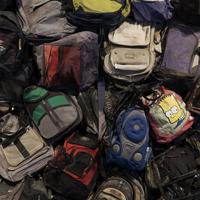
Mar 23, 2018
Border Trilogy
While scouring the Sonoran Desert for objects left behind by migrants crossing into the United States, anthropologist Jason De León happened upon something he didn't expect to get left behind: a human arm, stripped of flesh.
This macabre discovery sent him reeling, needing to know what exactly happened to the body, and how many migrants die that way in the wilderness. In researching border-crosser deaths in the Arizona desert, he noticed something surprising. Sometime in the late-1990s, the number of migrant deaths shot up dramatically and have stayed high since. Jason traced this increase to a Border Patrol policy still in effect, called “Prevention Through Deterrence.”
Over three episodes, Radiolab will investigate this policy, its surprising origins, and the people whose lives were changed forever because of it.
Part 1: Hole in the Fence:
We begin one afternoon in May 1992, when a student named Albert stumbled in late for history class at Bowie High School in El Paso, Texas. His excuse: Border Patrol. Soon more stories of students getting stopped and harassed by Border Patrol started pouring in. So begins the unlikely story of how a handful of Mexican-American high schoolers in one of the poorest neighborhoods in the country stood up to what is today the country’s largest federal law enforcement agency. They had no way of knowing at the time, but what would follow was a chain of events that would drastically change the US-Mexico border.
This episode was reported by Latif Nasser and Tracie Hunte and was produced by Matt Kielty, Bethel Habte, Tracie Hunte and Latif Nasser.
Special thanks to Centro de Salud Familiar La Fe, Estela Reyes López, Barbara Hines, Lynn M. Morgan, Mallory Falk, Francesca Begos and Nancy Wiese from Hachette Book Group, Professor Michael Olivas at the University of Houston Law Center, and Josiah McC. Heyman, Ph.D, Director, Center for Interamerican and Border Studies and Professor of Anthropology.
Jason de Leon's latest work is a global participatory art project called Hostile Terrain 94, which will be exhibited at over 70 different locations around the world in 2020. Read more about it here.
Support Radiolab today at Radiolab.org/donate.